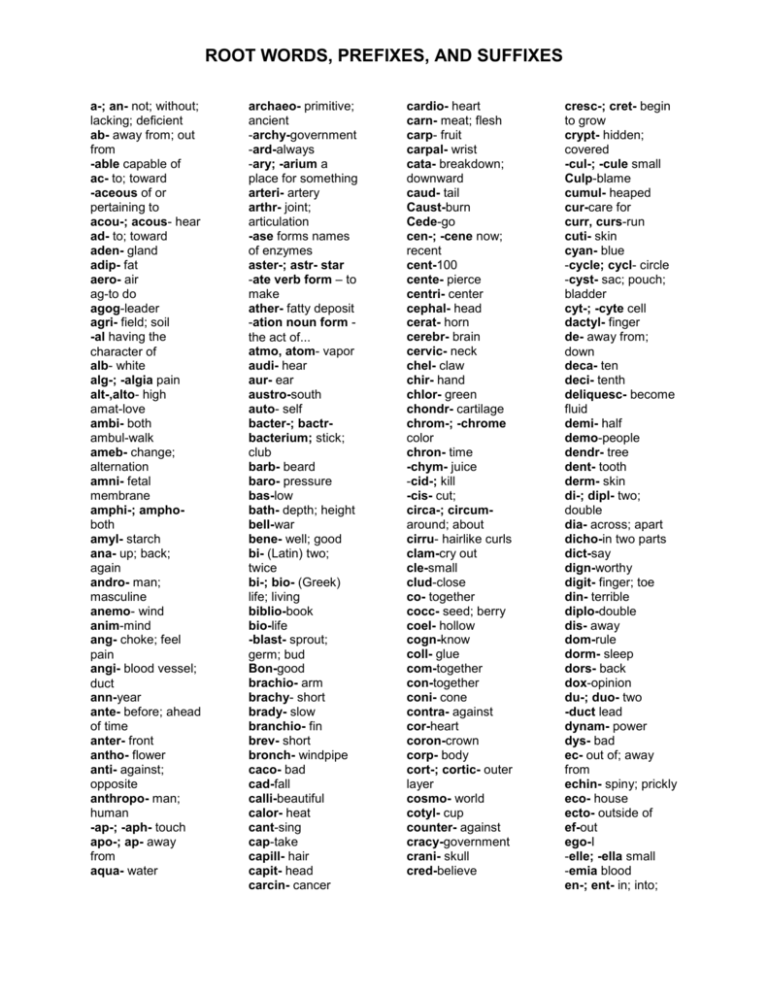

As she spoke, Maura moved her hands up and down in counteropposition, miming the up-and-down action of a balance scale. During the discussion, Maura (all students' names are pseudonyms) remarked that she could not make up her mind about the protagonist: Sometimes she respected him for the positions he was taking, but at other times she resented his actions and almost detested him. Others involve adjective bases to be studied in Chapter 19.Learning clusters of words that share a common origin helps students understand content area material.Ĭollege students in my Monday morning class were discussing a novel we were reading together. Those that are based on 3rd declension nouns will obviously make better sense after Chapter 18.

You should not expect to understand at once all the examples given above. krat ē s (> E -crat): a rist-o-crat, aut-o-crat, dem-o-crat, plut-o-crat, techn-o- crat, t he-o-crat > English -cracy: “power,” “government,” “rule”Īrist-o-cracy, dem-o-cracy, gynec-o-cracy, techn-o-cracy, the-o-cracy arch ē s or -archos (> E -arch), “ruler”: patri-arch, mon-arch, etc.Īrch- or archi- (“chief”): arch-angel, archi-tect, archi-pelago Hier-archy, patri-archy, matri-archy, mon-archy, olig-archy skopia (> E -scopy): tele-scopy, arthr-o-scopy, etc. > English -scope: “instrument for viewing”įluor-o-scope, gyr-o-scope, hor-o-scope, micr-o-scope, peri-scope, stere-o-scope, tele-scope, steth-o-scope, spectr-o-scope Phil-: phi l-anthropy, phil-o-logy (“love of words”), phil-o-sophy, phil-helleneĪcr-o-phobia, agora-phobia, hom-o-phobia, hydr-o-phobia, necr-o-phobia, xen-o-phobia, claustr-o-phobia (L hybrid, E -phobe), “fearer”: angl-o-phobe, franc-o-phobe, xen-o-phobe philos (> E -phile): angl-o-phile, franc-o-phile, bibli-o-phile, ped-o-phile > English -philia: “love”: necr-o-philia, hem-o-philia

maniakos (> E -maniac, both adjective and noun) Pyr-o-mania (also bibliomania, dipsomania, egomania, kleptomania, megalomania, monomania, nymphomania) metron (> E -meter): chro n-o-meter bar-o-meter, therm-o-meter > English -metry: “measurement” “art or science of measurement” gramma (> E -gram): cardi-o-gram, tele-gram g raphos (> E -graph): cardi-o-graph, phot-o-graph > English -graphy: “writing” “art or science of writing”īi-o-graphy, dem-o-graphy, cosm-o-graphy, lith-o-graphy, top-o-graphy This is a brief sample of a huge class of compound derivatives. Ge-o-logy, cardi-o-logy, morph-o-logy, phon-o-logy, psych-o-logy, techn-o-logyĪnthrop-o-logy, bi-o-logy, chron-o-logy, dendr-o-chron-o-logy, cosm-o-logy, ec-o-logy, necr-o-logy, ophthalm-o-logy, the-o-logy, top-o-logyĪnth-o-logy (here -logia means “collection”), dermat-o-logy, ethn-o-logy, gynec-o-logy, odont-o-logy In this list, the declension number of the noun base is often identified as (1), (2M), (2N), and (3) the 2nd declension is subdivided into -os (2M) and -on (2N) types. Quite clearly, -λογια should not be described as a suffix, though its derivative – logy may have assumed the status of a virtual suffix in the English language. Unlike μανια, which existed as an independent noun, -λογια was used only as a combining form in Greek-always in the second position, as in θεολογια ( the-o-log-ia, E theology).

The form -logia, for example, can be explained as λογ- + -ια. The following list of word-building elements consists, for the most part, of noun or verb bases to which have been added the abstract noun suffix -ια ( -ia). With even the limited Greek noun vocabulary now at our disposal, we’ll then have a precise understanding of many specialized compounds that might previously have seemed obscure or incomprehensible. By learning a handful of these elements, we can demystify literally hundreds of English words. The main objective of this chapter will be to introduce several standard forms that are often combined with other bases in English compounds derived from Greek.


 0 kommentar(er)
0 kommentar(er)
